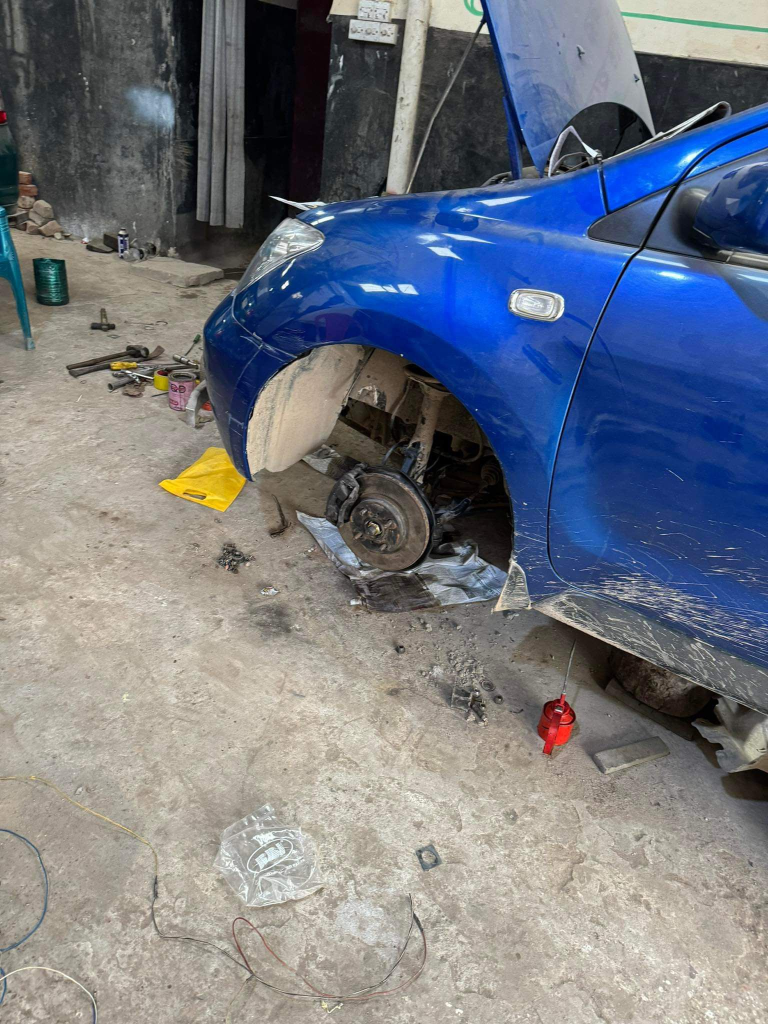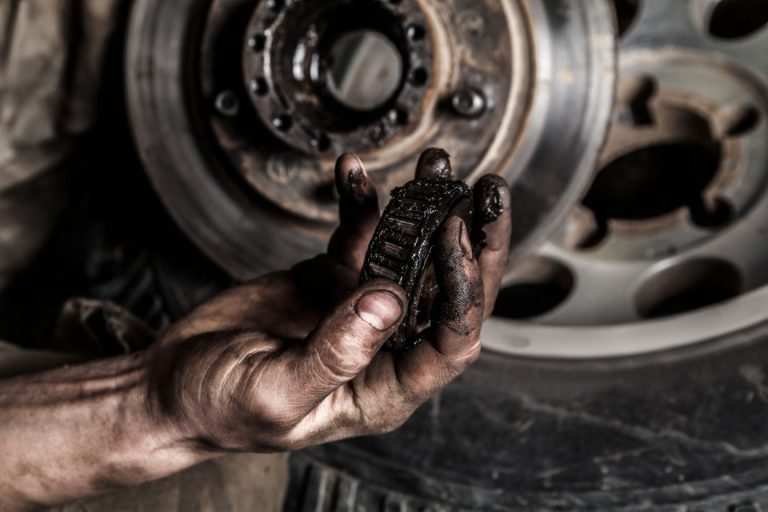Wheel bearing noise is often one of the first signs that your vehicle needs attention. If you hear unusual sounds like humming, grinding, or growling coming from your wheels, it could mean your wheel bearings are worn out.
These noises usually get louder as you speed up or when you turn the steering wheel. Ignoring these symptoms can lead to severe damage and unsafe driving. Recognizing these signs early helps you avoid costly repairs and keeps you safe on the road. Knowing the wheel bearing noise symptoms helps you take action before the problem worsens.
Understanding Wheel Bearings
Wheel bearings are small, strong parts inside a car’s wheels. They have steel balls or rollers that help the wheels spin smoothly with very little friction. These bearings support the car’s weight and make sure the wheels turn easily.
They are inside a metal ring and fit within the wheel hub, connecting the wheel to the car’s axle and suspension. By reducing friction, wheel bearings ensure a smooth ride, better control, and help save fuel by making the car move efficiently. If they wear out, they can cause noise or vibration while driving.
Common Wheel Bearing Noise Symptoms
Wheel bearings are vital parts that help your car’s wheels spin smoothly. When they start to wear out or fail, they produce different types of noises. These sounds are important warning signs to watch for because ignoring them can lead to bigger problems and unsafe driving.

Other Signs of Wheel Bearing Failure
Wheel bearing problems do not always start with noise. Many other signs can show that a bearing is failing and needs attention.
- Steering Wheel Vibrations and Instability
You might feel vibrations or shaking in the steering wheel, especially at higher speeds or during turns. The steering could also feel loose or less responsive, making the vehicle harder to control.
- Uneven or Rapid Tire Wear
A bad wheel bearing can cause the affected wheel to tilt slightly. This leads to uneven tire wear, often seen as more wear on one tire side compared to others.
- Vehicle Pulling to One Side
If the car pulls or drifts to one side while driving, it could be caused by a failing wheel bearing affecting wheel alignment and stability.
- ABS Warning Light
Wheel bearings are linked to ABS sensors. When bearings fail, they might trigger the ABS dashboard warning light, indicating sensor disruption.
- Wheel Play or Wobble
In severe cases, you might notice that the wheel has excessive movement or wobble if you push or pull on it when the vehicle is lifted.
- Heat Around the Wheel Hub
After driving, the affected wheel hub can feel hotter than others because of increased friction caused by the failing bearing.
Wheel Bearing Failure Signs to Watch For?
Wheel bearings help your car’s wheels spin smoothly and safely. When they start to fail, paying attention to signs can prevent bigger problems and ensure safe driving. Here are common signs to watch for:
Unusual Noises
Grinding, growling, humming, or squealing sounds from the wheel area are classic signs. These noises often get louder with speed and can change when turning.
Steering Wheel Vibrations
If your steering wheel shakes or vibrates, especially at higher speeds, it may mean the wheel bearings are worn and causing instability.
Uneven Tire Wear
A failing bearing can make the wheel tilt slightly, causing uneven tread wear, which reduces tire life and affects handling.
Vehicle Pulling to One Side
Your car might drift or pull to one side even on flat roads, a sign that the bearing affects wheel alignment and control.
Brake Problems & ABS Light
Damaged bearings can cause brake issues like less responsive brakes or cause the ABS warning light to come on due to sensor interference.
Wheel Play or Wobble
Excess movement or wobble when the wheel is lifted and shaken may indicate a loose or failing bearing.
How to Test Wheel Bearings?
Testing wheel bearings helps find problems early and keeps your car safe. Here are easy steps to check your wheel bearings:
- Listen While Driving
Drive at about 30–50 km/h. Listen for humming, grinding, or growling sounds. If the noise gets louder when you turn left, the right bearing might be bad, and vice versa. - Wiggle Test (Jack Test)
Use a car jack and jack stands to lift and secure the car safely. Grab the tire at 12 and 6 o’clock, then rock it back and forth. Then do the same at 3 and 9 o’clock positions. If you feel any loose wobble or clunk, the bearing might be worn. - Spin Test
With the car lifted, spin the wheel by hand. Listen for grinding or rubbing sounds and check if the wheel spins smoothly. Rough or dry sounds indicate a bad bearing. - Drive in Circles Test
In an empty parking lot, drive slowly in tight left and right circles. If a bearing is bad, the noise may get louder when the affected side is under load. - Check for ABS Light
Some wheel bearings connect to the ABS system. A faulty bearing might trigger the ABS warning light, so keep an eye on the dashboard.

Risks of Ignoring Wheel Bearing Noise?
Ignoring wheel bearing noise is dangerous and can cause serious problems.
Loss of Vehicle Control
A worn wheel bearing can make the wheel wobble, vibrate, or even lock up. This makes steering, handling, and braking unpredictable. You may lose control of the vehicle, especially on slippery or wet roads, increasing the risk of accidents.
Risk of Accidents
If a wheel bearing fails completely, the wheel could detach from the car. A detached wheel can cause serious crashes that might injure or even kill you and others on the road.
Expensive Vehicle Damage
Ignoring the noise causes more damage to parts connected to the wheel bearing, such as the hub assembly, CV joints, suspension, brakes, and tires. This leads to costly repairs or replacements that could have been avoided by fixing the bearing early.
Tire and Fuel Efficiency Issues
A bad wheel bearing causes the wheel to wobble, which leads to uneven tire wear and increases rolling resistance. This reduces tire life and wastes fuel, forcing you to spend more money on tires and gas.
Safety Warning Signs Should Not Be Ignored
Grinding or humming noises, vibrations in the steering wheel, ABS warning lights, and uneven tire wear are signs of worn bearings. Continuing to drive with these symptoms risks sudden failure and loss of control.
When to Seek Professional Help?
Seek professional help for wheel bearing noise immediately when you hear grinding, humming, or growling sounds from your wheels. Also, get help if you feel vibrations in the steering wheel, loose or wandering steering, or if your vehicle pulls to one side. Early diagnosis and repair prevent accidents, costly damage, and unsafe driving. Never ignore these signs and visit a mechanic as soon as possible.
Conclusion
Knowing the symptoms of wheel bearing noise is important for your safety. Unusual sounds like humming, grinding, or growling, especially when turning or speeding up, often signal worn bearings. You might also feel vibrations in the steering wheel or notice uneven tire wear.
Ignoring these signs can lead to serious damage and unsafe driving. Always pay attention to these symptoms and get your wheel bearings checked promptly to keep your vehicle safe and running smoothly. Prompt action protects you and others on the road.
FAQs
Can a bad wheel bearing cause vibrations in the steering wheel?
Yes, worn bearings can cause noticeable steering wheel vibrations, especially at higher speeds.
Is it safe to drive with a noisy wheel bearing?
No, driving with a failing wheel bearing is unsafe and may cause wheel or brake failure.
Can a wheel bearing noise go away on its own?
No, once a bearing starts making noise, it will only get worse over time and needs replacement.
Does a bad wheel bearing cause uneven tire wear?
Yes, worn bearings can affect alignment and lead to uneven tire wear.


